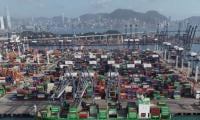Pak-India talks on Kishenganga and Ratle hydropower projects fail
Secretary water and power says Pakistan to move Court of Arbitration to settle dispute
ISLAMABAD: The two-day secretary-level talks between Pakistan and India in New Delhi on July 14-15 on the much-touted Kishenganga and Ratle hydropower projects have failed as both the nuclear states did not budge from their stances.
“Now we are going to move the Court of Arbitration (CoA) in The Hague to safeguard the water interests of Pakistan after exhausting all endeavours enshrined in the Indus Waters Treaty 1960, both at the level of PCIW (Permanent Commission of Indus Waters) and government-to-government level to resolve the dispute on the designs of both the hydropower projects,” one of the senior officials who was part of the eight-member delegation headed by Secretary Water and Power Younis Dhagha that held the crucial talks with the Indian side in New Delhi.
Pakistan’s side during the two-day talks prevailed and Indians agreed to nominally reduce the pondage of Kishenganga project but not as per the desire of Islamabad. “So the talks failed. During the meeting, we put up the Indian counterparts in defence with strong arguments; however, they remained glued to their stances on the designs,” he said.
In the Kishenganga case, the official said, the pondage in the India design has been kept at 7.5 million cubic meters (mcm) whereas Pakistan is of the view that the pondage should be for less than 1 mcm. The Indian side asked for another meeting on the issue, but we told them that in the last two and half years’ time, both sides held meetings but no result came out. “Now all the endeavours have been exhausted and the next step left with Pakistan is to move the court of arbitration.”
When asked how much time in moving the court of arbitration is required, the official said the court is comprised of seven judges out of which three will be impartial umpires and four will be arbitrators. Of the four arbitrators, two will be chosen by each country (Pakistan and India). This process of formulating the seven-member court of arbitration may take three to four months. However, it all depends upon the World Bank which the broker of Indus Waters Treaty (IWT).
When asked how much time the court will take to decide the dispute, the official said it again depends upon the court. To a question that if the projects with objectionable designs are completed during the legal battle, then what would be the fate of the projects, the official said that Article 4 of the IWT clearly says that in case the projects are completed in violation of the treaty, even then they will be demolished as the verdict of the CoA is the binding on both the parties to the disputes.
The CoA will decide during the first hearing the rules of procedure how to proceed on the case and Pakistan will desire to have the verdict in three to four hearings.
Younis Dhagha said Pakistan’s case is very strong as in the case of interpretation of Treaty with reference to the Kishenganga, The Hague court has already given the verdict on the issues of drawdown and Pondage in favour of Pakistan. “So we are hundred percent certain that Pakistan will win the case.”
The official said that India has exhausted all hydropower sites on Pakistan’s rivers of Chenab and Jhelum. However, India still can erect the hydropower projects on the tributaries leading to the rivers.
The 850MW Ratle Hydropower Project on Chenab river if gets constructed under its existing objectionable design, the water flow of Chenab river at Head Marala will reduce by 40 percent which will be very detrimental to the irrigation in central Punjab of Pakistan. India has awarded the contract of Rattle project to a private company that will run the project on BOT (build, operate and transfer) basis for 35 years and then it would hand over the project to India.
This dam will be three times larger than the Baglihar hydropower dam. India has already carved out the plan to generate 32,000MW electricity on Pakistan’s rivers that will enable New Delhi to regulate the water flows that are destined to reach Pakistan.
The official disclosed that Pakistan has raised the three objections on Kishanganga project’s design saying that the pondage of the project is 7.5 million cubic meter which is excessive and it should be one million cubic meter. Pakistan also wants India to raise intake by up to 1-4 meters and also raise spillways up to nine meters high. And on the issue of Ratle Hydropower plant, Islamabad raised four objections. Pakistan wants India to maintain free board at one meter whereas India wants to keep it at two meters. In addition, India wants to keep the pondage of 24 million cubic meters but Pakistan wants the pondage should of eight million cubic meters. Pakistan also wants the intake of the project should be raised by up to 8.8 meters and its spillways should be raised by up to 20 meters.
Coming to the decision of moving Court of Arbitration, the secretary said, the country’s top legal fraternity headed by Attorney General of Pakistan earlier remained in the process to assess as to whether Pakistan should move Neutral Expert (NE) or CoA against India for violations of the IWT in building 330MW Kishanganga Hydropower and 850MW Rattle hydropower project with faulty designs.
The decision to move World Bank for appointment of neutral experts has now got abandoned because of the internal debate of the top officials of the Ministry of Water and Power and legal fraternity headed by Pakistan’s Attorney General. Debate on whether the CoA should be moved or Neutral Expert on the dispute for justice continued for months as legal fraternity was of the view that moving the NE that consists of one man is highly risky arguing that in the case of Baglihar hydropower power project, one man Neutral Expert Professor Raymond Lafitte, a Swiss civil engineer appointed by the World Bank, had come up with the decision mostly in favour of India setting aside the provisions of the IWT. “One man Neutral Expert can also be influenced,” the legal fraternity had doubted.
The government is serious to win the battle and it can be gauged by the fact that it has hired the consortium of two US-based law firms that include Three Crowns and Walliams & Connelly. Both law firms are also well known lobbyists in the US,” a senior government official of the Law Ministry told The News.
-
 Eric Dane’s Friends Initiate GoFundMe To 'support' His Two Daughters After His Death At 53
Eric Dane’s Friends Initiate GoFundMe To 'support' His Two Daughters After His Death At 53 -
 Internet Erupts After Candace Owens Claims Elon Musk And Sam Altman Are ‘not Human’
Internet Erupts After Candace Owens Claims Elon Musk And Sam Altman Are ‘not Human’ -
 Will Princess Beatrice, Eugenie Stay In Contact With Andrew? Source Speaks Out
Will Princess Beatrice, Eugenie Stay In Contact With Andrew? Source Speaks Out -
 ‘AI Revolution Is Coming Fast & US Has No Clue,’ Bernie Sanders Warns Of Speed Of Disruption
‘AI Revolution Is Coming Fast & US Has No Clue,’ Bernie Sanders Warns Of Speed Of Disruption -
 Hong Kong Touts Stability,unique Trade Advantages As Trump’s Global Tariff Sparks Market Volatility
Hong Kong Touts Stability,unique Trade Advantages As Trump’s Global Tariff Sparks Market Volatility -
 ‘Miracle On Ice’ Redux? US Men Chase First Olympic Hockey Gold In 46 Years Against Canada
‘Miracle On Ice’ Redux? US Men Chase First Olympic Hockey Gold In 46 Years Against Canada -
 Friedrich Merz Heads To China For High Stakes Talks In An Effort To Reset Strained Trade Relations
Friedrich Merz Heads To China For High Stakes Talks In An Effort To Reset Strained Trade Relations -
 Astronauts Face Life Threatening Risk On Boeing Starliner, NASA Says
Astronauts Face Life Threatening Risk On Boeing Starliner, NASA Says -
 Hailey Bieber Reveals How Having Ovarian Cysts Is 'never Fun'
Hailey Bieber Reveals How Having Ovarian Cysts Is 'never Fun' -
 Kayla Nicole Looks Back On Travis Kelce Split, Calls It ‘right Person, Wrong Time’
Kayla Nicole Looks Back On Travis Kelce Split, Calls It ‘right Person, Wrong Time’ -
 Prince William And Kate Middleton Extend Support Message After Curling Team Reaches Olympic Gold Final
Prince William And Kate Middleton Extend Support Message After Curling Team Reaches Olympic Gold Final -
 Nvidia CEO Praises Elon Musk, Calls Him An ‘extraordinary Engineer'
Nvidia CEO Praises Elon Musk, Calls Him An ‘extraordinary Engineer' -
 Shia LaBeouf's Mugshot Released After Mardi Gras Arrest On Battery Allegations In New Orleans
Shia LaBeouf's Mugshot Released After Mardi Gras Arrest On Battery Allegations In New Orleans -
 Timothee Chalamet Felt '17 Again' After Reunion With 'Interstellar' Director Christopher Nolan
Timothee Chalamet Felt '17 Again' After Reunion With 'Interstellar' Director Christopher Nolan -
 Conan O'Brien Speaks First Time After Rob Reiner's Killing
Conan O'Brien Speaks First Time After Rob Reiner's Killing -
 Giant Tortoise Reintroduced To Island After Almost 200 Years
Giant Tortoise Reintroduced To Island After Almost 200 Years



